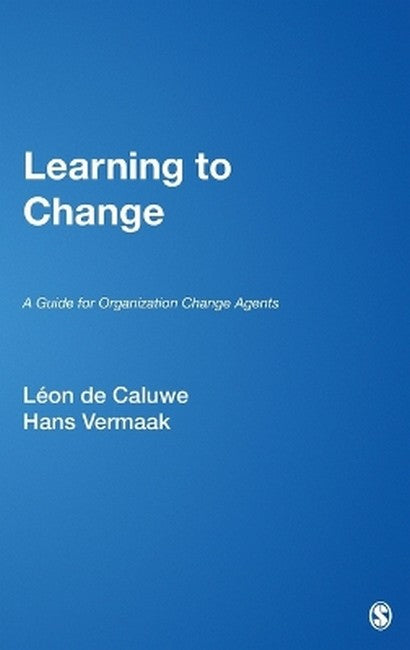Leon de Caluwe is senior partner with the Twynstra Group, management consultants and part time professor at the Free University in Amsterdam. Leon de Caluwe (1950) studied social psychology at the University of Utrecht. He received his science degree in 1975 and his Ph.D degree in 1997 at Tilburg University. He was appointed professor in Amsterdam in 2000. He leads the Center for Research on Consultancy at the Free University, which is part of an international network. He regularly works as expert for the OECD and the Council of Europe. At Twynstra Gudde (where he works since 1988) he is member of the thinktank of the company. In his work he is specialized in change, conflict resolution, quality of cooperation, culture-interventions, facilitation of policy development sessions. He works regularly with gamesand gaming metods as an intervention for advanced learning. He works for all types of clients, in government and in industry. He published more than 80 articles and more than 10 books. Several of them are in English, e.g. 'Changing organizations with gaming/simulation' (Elsevier publishers, 2000). The subjects are: change, consultancy and interventions. His dissertation: "Veranderen moet je leren" (1997) received the 'Best-book-of-the-year' award by the Dutch Association of Management Consultants. He is member of the Academy of Management, editor of several scientific journals and lecturer in many postgraduate and Masters programs. Hans Vermaak (1961) is a partner with the Twynstra Group. Hans Vermaak studied environmental sciences and organisational psychology in Utrecht and Florida. He received his science degree from the University of Utrecht in 1985. He worked as a faculty member at both the science and psychology departments of the University of Utrecht between 1982 and 1987. He was a social activist for many years and worked between 1987 and 1992 with the Institute of Environmental and Systems Analysis where he mediated conflicts between industry, government and the environmental movement and helped industries to create strategic environmental management. He followed courses in psychotherapy and counselling and has taught counselling since 1987 and has worked as an independent psychotherapist. He received a masters degree in Management Consulting from the 'Vrije Universiteit' in Amsterdam in 1994 and works as a management consultant with the Twynstra Group since 1993. His principle area of consulting concerns change management in professional firms and institutions. He trains and coaches change agents and he heads the knowledge center 'Change Management' of the Twynstra Group. He is a guest lecturer at several universities and frequently publishes articles and books on change management, professional organizations, coaching, futuring, etctera. His English publications include the articles "Conspiring fruitfully with professionals: new management roles for professional organisations", the paper "Prevailing Perspectives on Change" and the booklet "In Search of Corporate Learning; The Archipelago of Learning".
Request Academic Copy
Please copy the ISBN for submitting review copy form
Description
Preface Introduction Why Change is so Complicated On Loosely Coupled Systems On Managing and Being Managed On Chaos Thinking Sociopolitical Mechanisms Four Irrational Families of Theries Full Irrationalities Thinking About Change in Five different Colors Change Strategies and Approaches Five Meanings of the Word Change Five Ways of Thinking About Change in More Detail Ideals and Pitfalls New Colors and 'Super Paradigm' Working With Colors: The Joseph and Johanna Case The Main Elements of Planning Change Elements of the Method The Preceding Change Idea and the Actual Outcome History: Driving Factors Behind the Change Idea Actors The Change Phases Communication and Sense Making Steering Playing With the Elements: A Case Illustration From Idea to Outcomes Diagnose Change Strategy Intervention Plan Brainstorming Interventions Case "Organization X" Examples of Diagnostic Models The Eisenhower Principle, Curriculum Vitae, Time Sheets Profit Formula for Professional Organizaitons, Herring Bone Diagram, Task Dividion Scheme Balanced Scorecard, Portfolio Analysis, Activity-Based Costing Competition Structure, Environment Analysis, Experience Curves Core Qualities, I/R Professionals, Competencies Team Roles, Conditions for Team Success, Roles of the Staff Units Culture Types, Organization Configurations, The Organizational Iceberg Network Organization, Public Private Cooperation, Industrial Ecology Biographical Fit, Power Sources, Levels of Learning Optimal Conflict Level, Learning Curve, Process/Result Orientation The Clock, the Passage of Resistance, Two Change Forces Force-field Analysis, Mega-trends, National Cultures In Conclusion to This Chapter Examples of Intervention
"A good balance between theory and practice . . . it definitely fills a void in the [lack of] texts in the area and the change literature in general . . . a good fit for my graduate class on 'Managing Organizational Change." -- Anthony F. Buono "Like Gareth Morgan's Images of Organization, this book is a superb blend of theory and practicality. It demystifies chaos and paradox, and it encourages the understanding of organizational dynamics from multiple perspectives. It is refreshing to read a book that presents diverse theories and interventions so even-handedly." -- Andrea Markowitz, Ph.D., President

